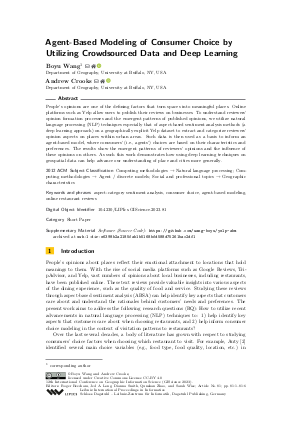Agent-Based Modeling of Consumer Choice by Utilizing Crowdsourced Data and Deep Learning (Short Paper)
Authors
Boyu Wang  ,
Andrew Crooks
,
Andrew Crooks 
-
Part of:
Volume:
12th International Conference on Geographic Information Science (GIScience 2023)
Part of: Series: Leibniz International Proceedings in Informatics (LIPIcs)
Part of: Conference: International Conference on Geographic Information Science (GIScience) - License:
 Creative Commons Attribution 4.0 International license
Creative Commons Attribution 4.0 International license
- Publication Date: 2023-09-07
File

PDF
LIPIcs.GIScience.2023.81.pdf
- Filesize: 1.6 MB
- 6 pages
Document Identifiers
Subject Classification
ACM Subject Classification
- Computing methodologies → Natural language processing
- Computing methodologies → Agent / discrete models
- Social and professional topics → Geographic characteristics
Keywords
- aspect-category sentiment analysis
- consumer choice
- agent-based modeling
- online restaurant reviews
Metrics
- Access Statistics
-
Total Accesses (updated on a weekly basis)
0Document
0Metadata
Abstract
People’s opinions are one of the defining factors that turn spaces into meaningful places. Online platforms such as Yelp allow users to publish their reviews on businesses. To understand reviewers' opinion formation processes and the emergent patterns of published opinions, we utilize natural language processing (NLP) techniques especially that of aspect-based sentiment analysis methods (a deep learning approach) on a geographically explicit Yelp dataset to extract and categorize reviewers' opinion aspects on places within urban areas. Such data is then used as a basis to inform an agent-based model, where consumers' (i.e., agents') choices are based on their characteristics and preferences. The results show the emergent patterns of reviewers' opinions and the influence of these opinions on others. As such this work demonstrates how using deep learning techniques on geospatial data can help advance our understanding of place and cities more generally.
Cite As Get BibTex
Boyu Wang and Andrew Crooks. Agent-Based Modeling of Consumer Choice by Utilizing Crowdsourced Data and Deep Learning (Short Paper). In 12th International Conference on Geographic Information Science (GIScience 2023). Leibniz International Proceedings in Informatics (LIPIcs), Volume 277, pp. 81:1-81:6, Schloss Dagstuhl – Leibniz-Zentrum für Informatik (2023)
https://doi.org/10.4230/LIPIcs.GIScience.2023.81
BibTex
@InProceedings{wang_et_al:LIPIcs.GIScience.2023.81,
author = {Wang, Boyu and Crooks, Andrew},
title = {{Agent-Based Modeling of Consumer Choice by Utilizing Crowdsourced Data and Deep Learning}},
booktitle = {12th International Conference on Geographic Information Science (GIScience 2023)},
pages = {81:1--81:6},
series = {Leibniz International Proceedings in Informatics (LIPIcs)},
ISBN = {978-3-95977-288-4},
ISSN = {1868-8969},
year = {2023},
volume = {277},
editor = {Beecham, Roger and Long, Jed A. and Smith, Dianna and Zhao, Qunshan and Wise, Sarah},
publisher = {Schloss Dagstuhl -- Leibniz-Zentrum f{\"u}r Informatik},
address = {Dagstuhl, Germany},
URL = {https://drops.dagstuhl.de/entities/document/10.4230/LIPIcs.GIScience.2023.81},
URN = {urn:nbn:de:0030-drops-189769},
doi = {10.4230/LIPIcs.GIScience.2023.81},
annote = {Keywords: aspect-category sentiment analysis, consumer choice, agent-based modeling, online restaurant reviews}
}
Author Details
Supplementary Materials
-
Software (Source Code)
https://github.com/wang-boyu/yelp-abm
browse
 archived version
archived version
References
- Eman Saeed Alamoudi and Norah Saleh Alghamdi. Sentiment classification and aspect-based sentiment analysis on yelp reviews using deep learning and word embeddings. Journal of Decision Systems, 30(2-3):259-281, 2021. URL: https://doi.org/10.1080/12460125.2020.1864106.
- Susan Auty. Consumer choice and segmentation in the restaurant industry. Service Industries Journal, 12(3):324-339, 1992. URL: https://doi.org/10.1080/02642069200000042.
- Milos Bujisic, Joe Hutchinson, and Haragopal Parsa. The effects of restaurant quality attributes on customer behavioral intentions. International Journal of Contemporary Hospitality Management, 26(8):1270-1291, 2014. URL: https://doi.org/10.1108/IJCHM-04-2013-0162.
- Claudio Cioffi-Revilla. Introduction to computational social science. Springer, New York, NY, 2017. URL: https://doi.org/10.1007/978-3-319-50131-4.
- Andrew Crooks, Alison Heppenstall, Nick Malleson, and Ed Manley. Agent-based modeling and the city: A gallery of applications. In Wenzhong Shi, Michael F. Goodchild, Michael Batty, Mei-Po Kwan, and Anshu Zhang, editors, Urban Informatics, pages 885-910. Springer, Singapore, 2021. URL: https://doi.org/10.1007/978-981-15-8983-6_46.
- Hai Ha Do, Penatiyana WC Prasad, Angelika Maag, and Abeer Alsadoon. Deep learning for aspect-based sentiment analysis: a comparative review. Expert Systems with Applications, 118:272-299, 2019. URL: https://doi.org/10.1016/j.eswa.2018.10.003.
- Bing Liu. Sentiment analysis: mining sentiments, opinions, and emotions. Cambridge University, Cambridge, UK:, 2015. URL: https://doi.org/10.1017/CBO9781139084789.
- Caroline Opolski Medeiros, Elisabete Salay, et al. A review of food service selection factors important to the consumer. Food and Public Health, 3(4):176-190, 2013. URL: https://doi.org/10.5923/j.fph.20130304.02.
- Ross Petchler and Sandra González-Bailon. Automated content analysis of online political communication. In Stephen Coleman and Deen Freelon, editors, Handbook of digital politics, pages 433-450. Edward Elgar Publishing, Cheltenham, UK, 2015. URL: https://doi.org/10.4337/9781782548768.00037.
- Kisang Ryu and Heesup Han. Influence of the quality of food, service, and physical environment on customer satisfaction and behavioral intention in quick-casual restaurants: Moderating role of perceived price. Journal of Hospitality & Tourism Research, 34(3):310-329, 2010. URL: https://doi.org/10.1177/1096348009350624.
- Wouter Van Atteveldt, Mariken ACG Van der Velden, and Mark Boukes. The validity of sentiment analysis: Comparing manual annotation, crowd-coding, dictionary approaches, and machine learning algorithms. Communication Methods and Measures, 15(2):121-140, 2021. URL: https://doi.org/10.1080/19312458.2020.1869198.
- Boyu Wang, Vincent Hess, and Andrew Crooks. Mesa-Geo: A GIS extension for the Mesa agent-based modeling framework in python. In Proceedings of the 5th ACM SIGSPATIAL International Workshop on GeoSpatial Simulation, (GeoSim '22), page 1–10. Association for Computing Machinery, 2022. URL: https://doi.org/10.1145/3557989.3566157.
- Heng Yang and Ke Li. PyABSA: Open framework for aspect-based sentiment analysis. arXiv preprint arXiv:2208.01368, 2022. URL: https://doi.org/10.48550/arXiv.2208.01368.
